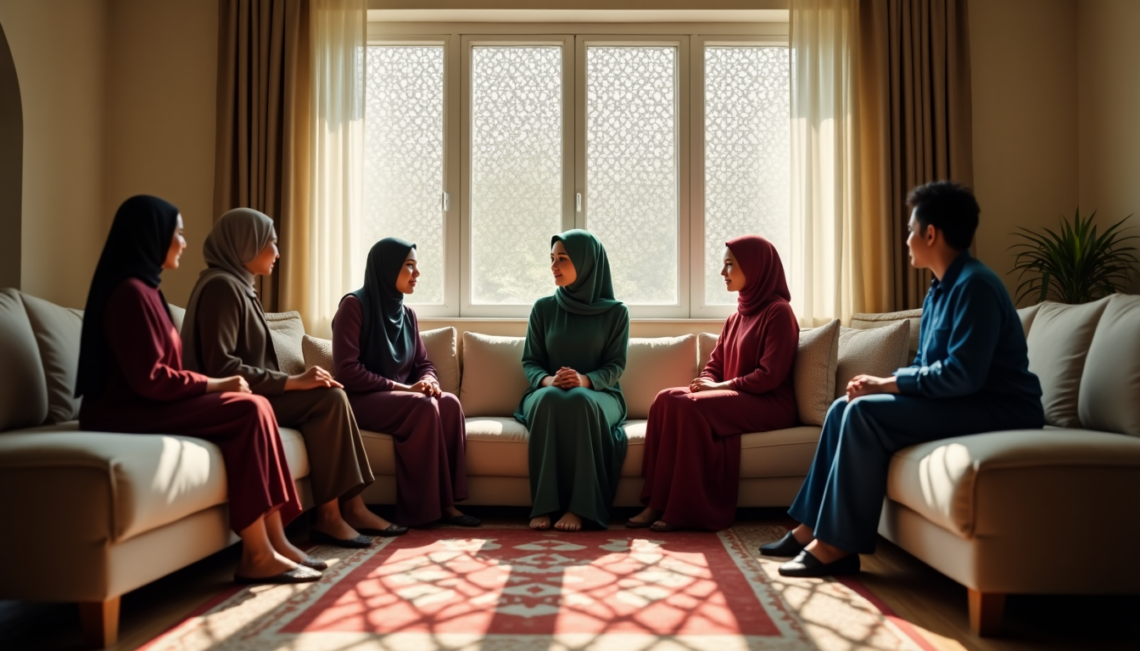A Woman’s Perspective
Muslim marriage often represents a delicate balance between personal choice and family expectations. While family involvement is deeply rooted in Islamic traditions, many Muslim women today find themselves navigating between cultural practices and their individual preferences.
Although family influence can provide valuable guidance and support, understanding where tradition ends and personal rights begin becomes crucial for modern Muslim couples. This comprehensive guide explores the complex dynamics of family involvement in Muslim marriages, from spouse selection to raising children, while examining the authentic Islamic teachings about women’s rights in marriage.
We’ll address the challenges of maintaining autonomy, setting healthy boundaries, and building strong partnerships despite external pressures. Whether you’re preparing for marriage or already married, this article offers practical insights for balancing family relationships while honoring both religious values and personal choices.
Family Influence During the Spouse Selection Process
The family unit forms the cornerstone of spouse selection in Islamic traditions, creating a complex dynamic between individual desires and collective expectations. In many Muslim communities, marriage represents not just a union between two individuals but a connection between families that carries social, cultural, and religious significance.
Parental expectations vs. personal choice
Traditional Muslim households often view marriage as a family affair rather than strictly an individual decision. Parents frequently feel entitled to give substantial input on their children’s marital choices out of genuine love and concern. However, Islamic teachings establish clear boundaries regarding consent.
The Prophet Muhammad emphasized that a woman’s consent is essential for a valid marriage. As one narration states: “A woman’s approval must be sought regarding her marriage” [1]. This creates a natural tension between parental guidance and individual autonomy that many Muslims navigate daily.
Parents generally base their preferences on practical considerations like family background, education, and religious commitment. Many believe their life experience equips them to evaluate potential matches more objectively than their children. Nevertheless, when parents reject suitors for purely cultural reasons unrelated to Islamic principles, conflicts frequently arise [2].
Join India’s leading Muslim Matrimonial platform, salaamsoulmate.com, and connect with your perfect match today!
The pressure to marry within certain families
Family pressure often intensifies when specific cultural or ethnic expectations come into play. In many Muslim-majority countries, marriages serve as connections between communities and families, with parents sometimes prioritizing familial bonds over individual compatibility [3].
These pressures can manifest as expectations to marry within extended family networks or specific cultural communities. Some parents resist marriages outside their ethnicity or nationality, imposing cultural traditions that have no basis in Islamic teachings [2]. Instead of recognizing that Islamic principles prioritize religious commitment and character, some families place undue emphasis on nationality, wealth, or social status [4].
How cultural traditions affect marriage decisions
The influence of cultural traditions on Muslim marriages varies widely across different regions. Many Pakistani Muslims, for instance, have developed misconceptions that blend Hindu cultural practices with Islamic teachings regarding marriage [5]. Consequently, practices like considering a female’s consent unnecessary, prohibiting pre-marital meetings, or treating dowry as the woman’s family’s responsibility persist despite contradicting authentic Islamic teachings.
In contrast, a study comparing marriage beliefs between Pakistani and Qatari Muslims found that Qataris’ marital beliefs were significantly closer to authentic Islamic teachings [5]. This highlights how culture profoundly shapes religious interpretation and practice regarding marriage.
Navigating family suggestions while maintaining autonomy
Finding balance between respecting family input and maintaining personal choice requires thoughtful navigation. According to Islamic teachings, the general principle is that one should obey parents in matters beneficial to them that cause no harm to oneself [6]. This means children aren’t obligated to follow parental marriage preferences that go against their happiness or well-being.
For many Muslims living in multicultural societies, this balancing act becomes particularly challenging. Some families adapt by implementing a process where parents perform initial character screening while the children maintain final decision-making authority [1]. Others engage religious leaders or community members to mediate between traditional expectations and personal preferences.
Furthermore, young Muslim adults increasingly recognize that marriage represents a lifetime commitment requiring genuine compatibility and mutual attraction—factors that cannot be determined by family members alone. This realization empowers many to respectfully advocate for their preferences while honoring family relationships.
Understanding Your Rights in Islamic Marriage
Islamic marriage rights often become clouded by cultural practices that have little foundation in religious teachings. With many Muslim women struggling to distinguish between authentic Islamic principles and cultural expectations, understanding one’s rights becomes essential for making informed decisions.
The importance of consent in Islamic marriage
Consent forms the bedrock of Islamic marriage law. Free and willing consent from both parties is mandatory for a valid Muslim marriage. The marriage contract is considered void without the genuine agreement of both the bride and groom. Several Hadith emphasize this principle, including the Prophet Muhammad’s statement: “The virgin is not to be married until her consent has been sought.”
Even silence can indicate consent for a shy woman, but only when she isn’t being coerced. Moreover, Islamic law protects women from forced marriages, with the Prophet giving women who were married against their will the option to nullify such marriages, emphasizing that parents have no right to force marriage upon their daughters.
What the Quran says about women’s choice in marriage
The Quranic foundation for marriage emphasizes mutual consent and respect. As stated in Surah An-Nisa, marriages should foster love and mercy between spouses. The Quran also instructs: “When they reach their term, place not difficulties in the way of their marrying the husband of their choice if it is agreed between them in kindness” (Qur’an, 2:232).
Additionally, Islamic scripture establishes that a woman has intellectual capacity and wisdom to make decisions about her own settlement. The essence of Islamic marriage – “aijab o qabool” (asking and accepting) – highlights the contractual nature requiring both parties’ agreement. The Quran further protects women’s economic rights, stating they are not obligated to spend their wealth on the husband or children unless by choice.
Common misconceptions about women’s rights
Several persistent misconceptions about women’s rights in Islam contradict authentic teachings:
- Women cannot marry non-Muslims – Actually, the Quran permits both men and women to marry from the “people of the book” (Muslims, Christians, Jews)
- Women cannot initiate divorce – Islamic law provides women pathways to divorce through various mechanisms including delegated divorce (ṭalāq al-tafvīḍ)
- Women must always obey husbands – Islamic scholars clarify that a husband’s superiority is relative and a wife’s obedience is restrictive, not absolute
- Women need male guardians to marry – Schools of thought differ, with Hanafi jurisprudence not requiring a guardian for adult women
The difference between cultural practices and religious teachings
Cultural practices frequently diverge from Islamic teachings regarding marriage. In some communities, traditions like Vani, WattaSatta, and marriages to the Quran persist despite contradicting fundamental Islamic principles of consent. A study found that 80% of respondents acknowledged Islam prioritizes a woman’s opinion in marriage, yet these rights are often denied due to cultural norms.
The gap between religious awareness and practice stems primarily from rigid social norms that override Islamic teachings. Many families adopt only those religious principles that align with existing cultural practices. For instance, the Malikis recognize a woman’s right to seek divorce for reasons including cruelty, desertion, or harmful conditions, yet cultural stigma often prevents women from exercising these rights.
Ultimately, authentic Islamic teachings empower women with choice, dignity, and protection in marriage, contrasting sharply with cultural customs that occasionally marginalize women’s voices in marital decisions.
Balancing Family Dynamics After Marriage
Family dynamics often shift dramatically after the wedding ceremony, requiring Muslim couples to navigate new relationships while preserving their marital bond. In fact, studies have identified family interference as a significant challenge, with approximately 10% of Muslim divorces resulting directly from this issue.
Setting boundaries with in-laws
Establishing clear boundaries early in marriage proves crucial for maintaining a healthy relationship. Muslim couples must move from dependent relationships with parents to an interdependent partnership with their spouse. This transition requires setting limits that protect the marriage while maintaining respect for extended family.
Boundaries should address several key areas:
- Frequency of visits and calls
- Privacy in decision-making
- Financial independence
- Childrearing approaches
Islamic teachings affirm that a wife does not have to obey her in-laws in any matter unless they advise what is religiously obligatory or forbid what is prohibited. Furthermore, in-laws must seek permission before entering the couple’s private space, as the Quran states: “Enter not houses other than your own until you have asked permission.
Maintaining relationships with your own family
Both spouses have the right to maintain strong connections with their birth families. From an Islamic perspective, a wife has the right to visit her parents regularly without requiring permission from in-laws. The husband should facilitate these relationships since maintaining family ties (silat al-rahm) remains a fundamental Islamic value.
For geographically separated families, technology offers valuable connection opportunities through platforms like WhatsApp, Facetime, and Skype. What matters most is quality interaction rather than merely staying connected through group chats.
When families interfere in marital decisions
Family interference often stems from insecurity and fear of losing influence over their child. Some parents unconsciously meddle in their children’s marriages because they struggle with the shifting relationship dynamics.
When interference occurs, couples should:
First, present a united front. The spouse related to the interfering family member should take primary responsibility for addressing the issue. As one counselor advises: “Your husband must be your spokesperson…it would be expected that their son let them know respectfully that such comments are unacceptable.
Second, communicate assertively with kindness and respect. Avoiding ambiguous responses like “I don’t know” or “probably” prevents others from taking advantage of perceived insecurities.
Third, consider physical distance if interference becomes damaging to the marriage. While Islamic teachings emphasize honoring parents, this doesn’t mean allowing them to harm your marital relationship.
Ultimately, successful Muslim marriages depend on couples establishing themselves as an independent unit while maintaining appropriate connections with extended family. This balance requires ongoing communication, mutual support, and a shared understanding of Islamic principles regarding family relationships.
Building a Partnership Despite External Pressures
Successful Muslim marriages thrive on partnership that can withstand external influences. Beyond family dynamics and personal rights lies the practical challenge of building a strong marital alliance amid varying opinions from well-meaning relatives.
Creating a united front with your spouse
Building a strong partnership requires mutual respect, which Islam considers essential for marital harmony. The Prophet Muhammad emphasized that respecting one’s spouse ensures both partners feel valued, thereby strengthening their bond and preventing conflicts. This respect forms the bedrock upon which couples face external pressures together.
Studies show that couples who engage in joint Islamic activities develop stronger resistance to external pressures. As one Islamic counselor notes, “Couples who do not have a joint Islamic activity are more susceptible to falling out over petty matters.” These activities might include:
- Studying Qur’an together
- Participating in community service
- Establishing a Da’wah project
- Supporting Islamic education initiatives
The distance between Allah and a couple often directly correlates to the distance between the spouses themselves. Specifically, the more time spouses spend in joint worship and Islamic pursuits, the more their relationship strengthens against external influences.
Making joint decisions as a couple
Islamic teachings strongly emphasize Shūrā (mutual consultation) as the foundation for decision-making. The Quran advises: “And their affair is [determined by] consultation among themselves” (42:38). This consultation process ensures both spouses feel heard and valued.
Certainly, involving your spouse in family decisions demonstrates respect for their input and strengthens your partnership. When couples make decisions together, they create a sense of shared responsibility that helps them withstand pressure from extended family.
Research indicates that joint decision-making yields better outcomes than when decisions are made by one spouse alone. This occurs primarily because joint decisions allow couples to share responsibility, especially when facing potential negative consequences from family members.
Dealing with conflicting family advice
Family interference can create tension between spouses, especially when it comes to marital decisions. Especially important is establishing clear boundaries with family members who offer unsolicited advice.
Initially, couples should discuss conflicting advice privately, determining their own stance before responding to family. Subsequently, the spouse related to the interfering family member should take primary responsibility for addressing the situation, presenting the couple’s unified decision rather than individual preferences.
Ultimately, maintaining a balanced approach to external advice while prioritizing your partnership creates a strong foundation for long-term marital success.
Raising Children Between Two Family Cultures
Raising children across different family cultures creates unique challenges and opportunities for Muslim couples, requiring thoughtful navigation of diverse traditions while maintaining Islamic principles.
Navigating different parenting approaches
Islamic tradition divides childhood development into three distinct seven-year phases. Throughout the first phase, parents should primarily play with children as they form their foundation. The second phase focuses on teaching them religious and secular knowledge, while the third phase transitions to advising as they develop independence.
This framework helps couples balance traditional and modern parenting styles. When parents and grandparents have differing views on upbringing, children often experience confusion and respond with frustration. To minimize this, couples should establish consistent approaches based on Islamic principles rather than cultural habits.
Balancing grandparents’ influence
In Islam, grandparents hold a position of honor equivalent to parents. As one tradition states, “the grandmother is held in the same status as the mother and the grandfather is held in the same status as the father. This elevates their right to kindness and connection with grandchildren.
Nevertheless, parents remain primarily responsible for their children’s Islamic upbringing. When grandparental influence conflicts with parental guidance, couples must establish respectful boundaries while maintaining family connections. Under no circumstances should parents completely sever ties with grandparents, as this would be considered impermissible.
Teaching children about family values while maintaining independence
Family values in Islam center around trust, compassion, support, and mutual respect. Teaching children these principles requires modeling them consistently, as children quickly notice inconsistencies between what parents say and do.
Simultaneously, Islamic parenting acknowledges children’s developing autonomy. Parents should gradually provide opportunities for children to make decisions and learn from experiences, fostering independence while guiding them with Islamic principles.
Indeed, balancing guidance with independence strengthens children’s resilience and attachment to both family and faith. Research shows positive relationships offset the harmful effects of difficult life experiences, making the parent-child bond a crucial element of successful Muslim family life.
Conclusion
Muslim marriages thrive when couples understand their religious rights while respecting family bonds. Although family involvement remains deeply rooted in Islamic traditions, successful marriages depend on establishing clear boundaries that protect both spousal relationships and extended family connections.
Religious teachings offer clear guidance about consent, individual rights, and family relationships. These principles help couples navigate between cultural expectations and authentic Islamic practices. Married couples who establish themselves as independent units while maintaining appropriate family ties often build stronger, more resilient partnerships.
Raising children adds another layer of complexity, yet couples who align their parenting approach with Islamic principles while respecting both family cultures create harmonious environments for their children. Most importantly, maintaining open communication and mutual respect allows couples to face external pressures together, strengthening their bond through shared values and understanding.
Balancing family influence in Muslim marriages requires wisdom, patience, and commitment to Islamic principles. Couples who establish healthy boundaries early, communicate effectively with extended family, and work as a team create lasting partnerships that benefit everyone involved.






